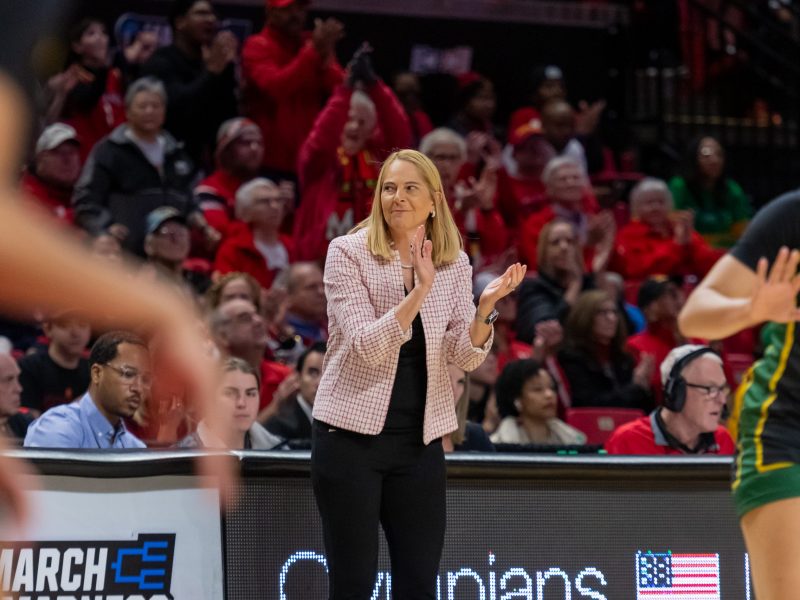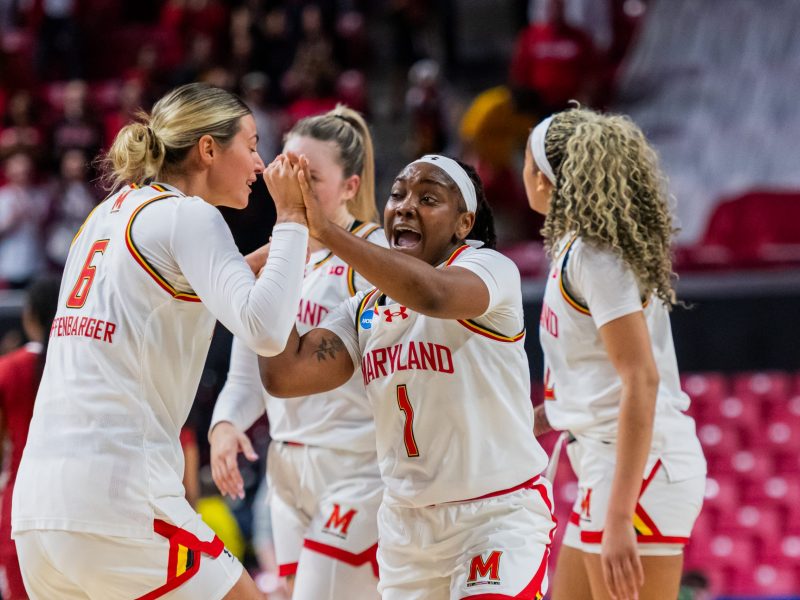
State representatives in the Maryland General Assembly were greeted by university students yesterday.
ANNAPOLIS – With several crucial issues making their way through the state legislature, students said lobbying on behalf of university issues is more important now than ever.
About 90 students traveled to Annapolis last night to lobby their representatives on several state bills, including a proposed 3 percent in-state tuition increase, open-source textbooks and other issues. On the bus ride over, Student Government Association officials gave attendees a list of talking points to discuss with state lawmakers as well as a list of appointment times with their respective representatives.
Among the dozens of undergraduates were about 10 graduate students who came prepared with their own list of issues, including the long-debated right for graduate students to unionize and employ collective bargaining powers.
Before students went off on their own, university President Wallace Loh joined SGA President Steve Glickman in addressing the crowd — which featured about 30 more students than last year.
“This is the most people we’ve had come out to this event, ever,” Glickman said. “I think that it’s a testament to the students here … and it really shows that university students really care about the issues that affect us.”
Summer Raza, SGA director of governmental affairs and event organizer, said the increased number of students allowed for greater outreach to state officials.
“Since we have a lot more people, we’re approaching a lot more legislators,” she said. “We know who the legislators are that deal with the issues we are looking to advocate for.”
Loh said it was impressive to see so many students actively engaging their representatives.
“This is democracy in action,” he said. “It’s just inspiring to see the next generation of leaders in this room.”
He then asked students to imagine the state as an overburdened airplane.
“The airplane is trying to gather speed and fly higher, but it is very heavy, so to rise even higher, you have to reduce the weight,” Loh said. “You can throw out lots of things, but what you cannot do is eliminate one of the engines because then that plane will stall.”
Loh likened one of the airplane’s engines to the university, noting that the school is a $3.4 billion economic engine for the state.
Raza said she hoped students would advocate for the tuition increase and sustaining the university budget, but added students have the ability to lobby their representatives on issues they’re personally invested in as well.
“As far as the social issues are concerned, I think that it’s up to the students’ discretion whether or not they need to advocate, communicate and collaborate with the legislators on those topics,” she said.
For graduate students such as government and politics student Dror Yuravlivker, was the ability to collectively bargain and the right to unionize. Since many graduate students act as teaching or graduate assistants, student leaders have pushed for the ability to be treated like state employees.
“In many respects we’re treated as employees but we don’t have the same rights as other employees of the state,” Yuravlivker said, adding that graduate students at state universities in Michigan, California and Wisconsin have the right to form unions. “We need to make sure that the interests of the students and the interests of the state are connected. In this case, I really do see the two interests coinciding.”
There is no bill making its way through Annapolis that addresses graduate students’ right to form unions. Because of this, Yuravlivker said, it’s important students keep the issue at the forefront of lawmakers’ minds and agendas.
“The bill needs to be reintroduced, so my guess is that it’s not going to happen in the immediate future,” Yuravlivker said. However, he remains hopeful. “I don’t want the idea to die … and I hope that in the coming years the university, government and administration will be more supportive.”
Although enthusiasm ran high throughout most of the evening, several students said there was some confusion and a few setbacks during the course of the event.
Brendan Cusack, a sophomore chemistry major who lobbied for issues such as the Plastic Carryout Bags Bill and the Religious Freedom and Civil Marriage Protection Act, was one of several students who could not speak with their representatives.
“Both groups of my legislators weren’t there,” he said. “But I did have good results with other people that I talked to. I found them extremely receptive.”
Nonetheless, Cusack said the event was a good chance to get professional experience and see how things work in state government.
Jacob Crider, a senior history major, had similar difficulties with meeting with his legislators.
“I didn’t have that much success because both of them were in a meeting,” he said. “But overall it was a good experience because it taught me a lot in terms of what I need to do to lobby and how to speak to individual senators and legislators.”
In addition to students and state officials mingling in the hallways of the State House and chatting over one another, other lobbying organizations were also seeking out state legislators to lobby them on behalf of special interests. This, along with the fact that one legislator may have had several constituents waiting to speak with him or her, made the atmosphere enjoyable but sometimes difficult to navigate, Yuravlivker said.
“The delegates I met with were friendly and open and encouraged me to follow up with their aides on specific questions,” he said. “However, I wasn’t the only one looking to meet with them, so it was hard to get my points across.”
These critiques were nothing new for the SGA. Raza said students encountered similar issues in the past.
“There were a few glitches with last year’s event,” she said. “Sometimes the legislators weren’t present when the appointments were made last year.”
Many students who attended last night’s event said they intend to return to Annapolis.
Crider, for one, said he looks forward to returning to the State House to speak with lawmakers about legislation that would allow children of undocumented immigrants, but who have gone to high school in the state, to qualify for in-state tuition.
“The event was a great opportunity, and it helped prepare me for when I come back and start to lobby for the DREAM Act,” he said. “With the experience I have here, it’s definitely going to serve myself and my constituents in the future.”
marcot at umdbk dot com


